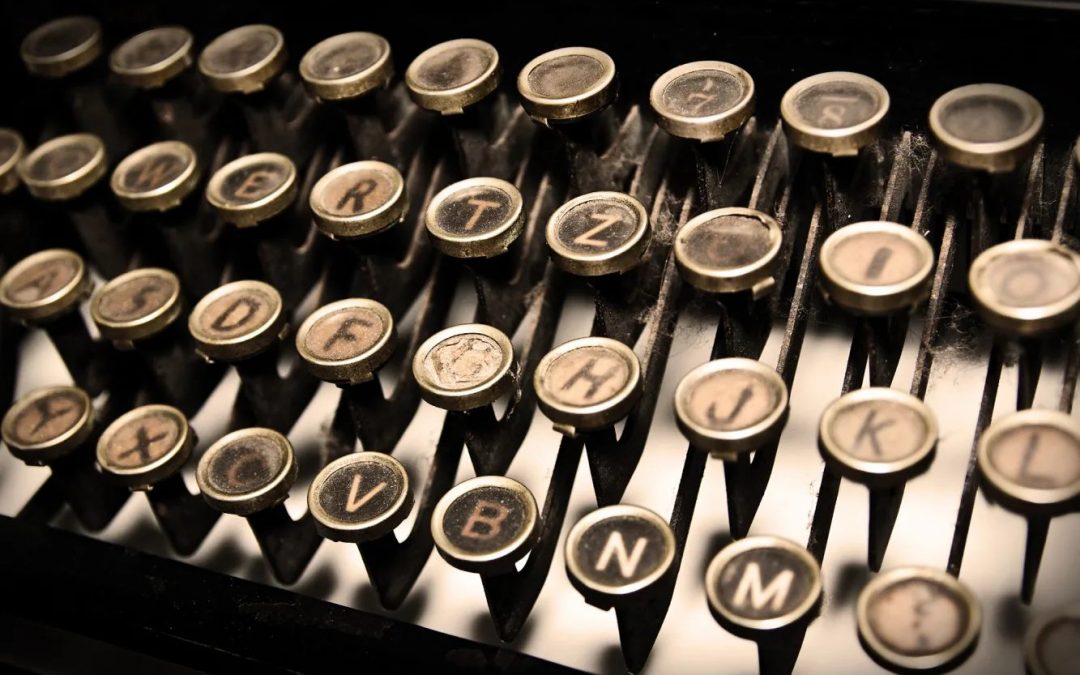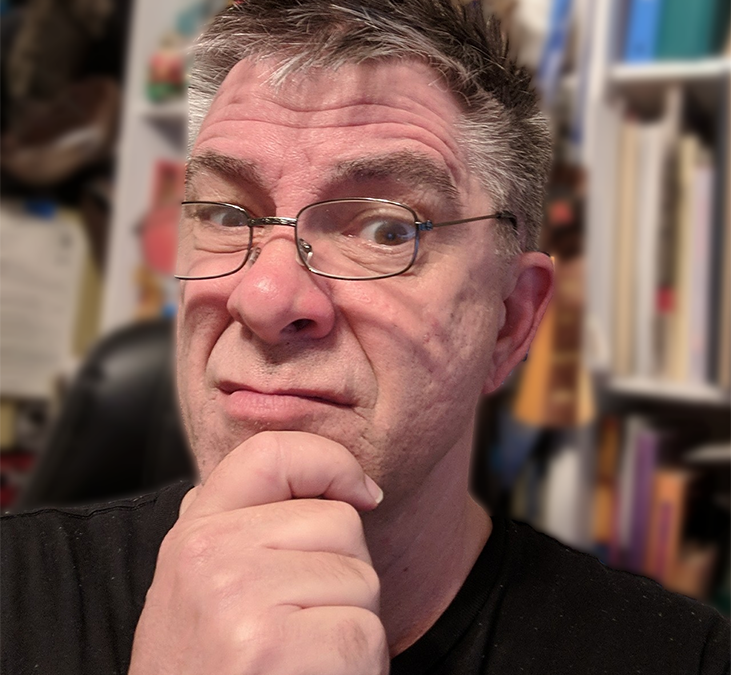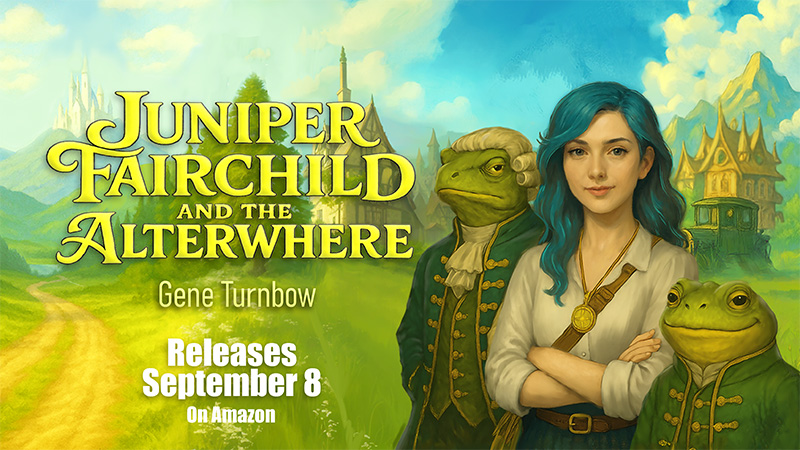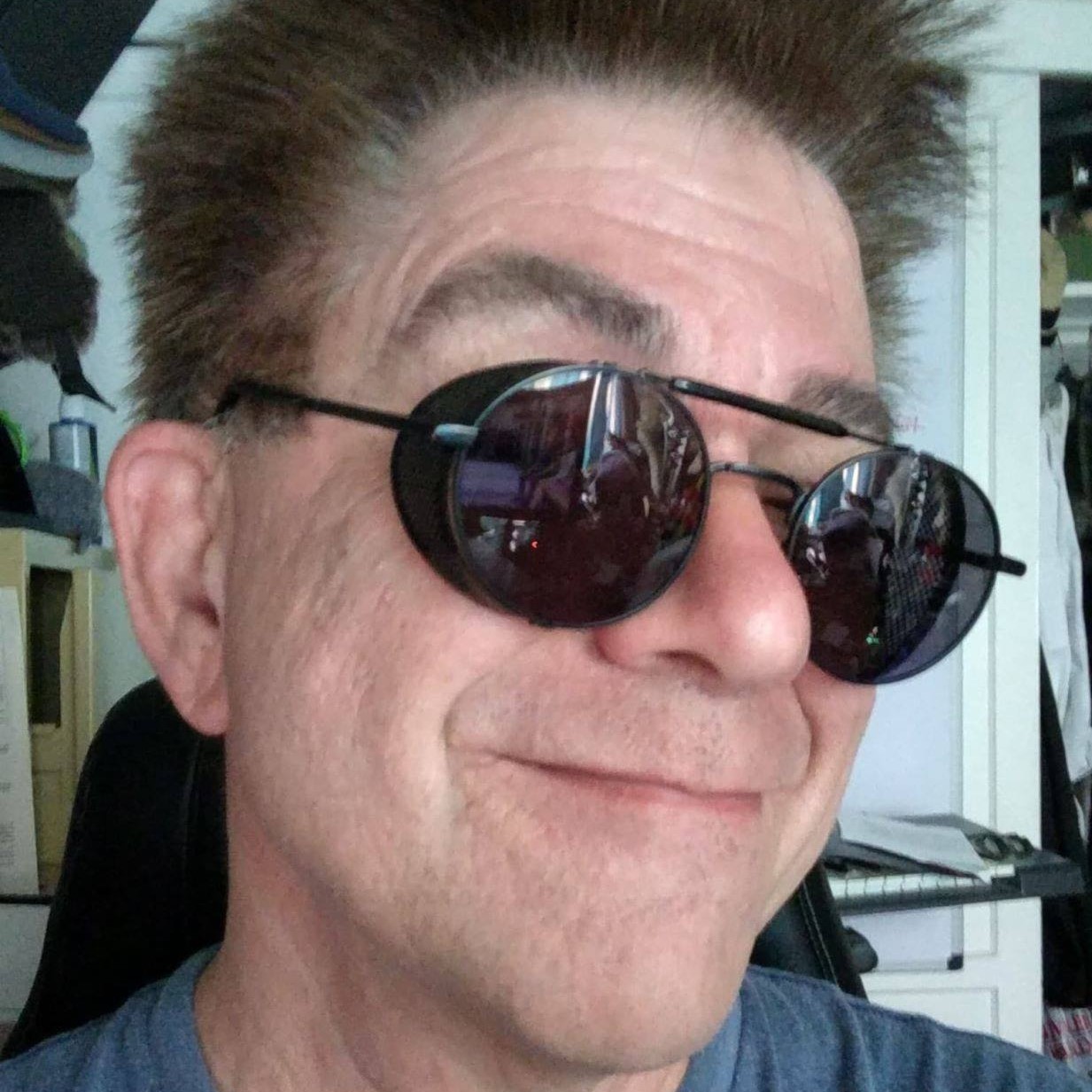by Gene Turnbow | Nov 4, 2025 | Books, Writing
I keep hearing this trope about how your characters speak to you and have minds of their own. I never understood this.
As a writer, I either know what my characters should be doing, and where my story is supposed to be going and why, and the emotional notes I want to hit and why, and then I make them do what I want.
And If I can’t, it means I haven’t thought things through properly, or worked out enough of the back story for my characters, so I go back and do the missing work. I’m never surprised by what my characters do in my stories. They are as I write them.

by Gene Turnbow | Oct 11, 2025 | Books, Business, Writing
This is just sort of a grab bag of stuff I learned while publishing my first book, Juniper Fairchild and the Alterwhere. This advice applies to both indie authors and operators of small press.
Know Your Genre. Read.
Read everything. It’s great if you know the classics, but read the new stuff. Learn how to build your stories so that they fit in the formats your anticipated audience will expect to see.
Do not write a 600 page doorstop as your first book. You can do that later if you get popular. Likewise, do not write a pamphlet and present it as a book and expect to be taken seriously.
Organize Everything
People who say they write by the seat of their pants aren’t telling you the whole truth: sooner or later you have to make an outline, and you have to fit what you’ve written into that outline, or you haven’t got a book. It’s better to plan things out, then write. Authors who can write straight ahead are those who are so skilled that they can do the planning part in their heads without writing it down. You are not one of those writers.
ISBN Numbers
You should buy a batch of ISBN numbers from Bowker. Don’t buy them one at a time. Each version of your book will need a separate one, and by the time you’ve used three, you might as well have bought the ten pack.
Do not buy ISBN numbers from anyone else. They’re lying to you when they say they can sell you one. ISBN numbes are not transferrable, and Bowker is the only source.
Do NOT pay the extra $25 for a barcode from Bowker. Bar codes are automatically generated by both KDP and Ingram Spark and applied to your book cover for you, so you never have to fuss with it, and you get those bar codes for free.
If the only place you will ever publish your book is Amazon, then you do not need an ISBN number at all, they can supply you with one (but because they actually own that ISBN number and not you, you cannot use the ISBN number you get from them anywhere but on Amazon).
If you’re Canadian, don’t buy your ISBN number from anybody. Get an account with Library & Archives Canada, which will issue you a batch of ISBN numbers for free. Follow this link to find out what you need to know.
Copyrights
File for a copyright for your work. It only costs $45, and you can’t necessarily rely on your publisher to do it for you, even if they’re contractually obligated to do it, because publishers are human at best, and people forget things. If you’re publishing your own work, there’s no excuse not to. If you run your own publishing company, encourage your authors to do it themselves and show them how. Authors owning their own copyright is a powerful thing.
Library of Congress Numbers (LCCN) – Getting into Libraries
To get your book into libraries, you’ll likely want to take the extra step of getting your book registered with the Library of Congress, and that means sending them two physical copies of your book. In return, you get an LCCN, a Library of Congress Control Number. That number, when used by other libraries, provides access to other important information about your book.
Do you have to have an LCCN to publish? No.
Can you get into bookstores without one? Yes.
However, all the best books, and every book published by the Big Five, have LCCN’s. If you want to be taken seriously, an LCCN is advised, and people expect to see it on your copyright page. Your opinion on this may differ from mine, but I think it skipping this would be like going to a dinner party in a tuxedo jacket and bermuda shorts, or in a cocktail dress and beach sandals.
Getting Into Bookstores
It’s easier than you think. You just have to go through all the steps.
If you want to get your book into libraries and bookstores, you will have to publish either through Barnes & Noble Press, or Ingram Spark. There is no point in doing both. Either of them will ask you for an ISBN number and will not provide one to you.
Once you are listed on either of these services, though, any bookstore in the world and any library in the world will be able to order your book. If your book is listed on Ingram Spark, it will automatically also be listed on Barnes & Noble. I walked into a local Barnes & Noble, introduced myself, showed them my book, and they ordered from Barnes & Noble on the spot.
Don’t Do Your Interior Design in Word. Just… don’t.
Don’t submit the interior design of your book as a Word document. I know they all accept that format, but don’t do it. For a good interior design, you will want pixel accurate control. You’re not getting that from a Word document. Use Atticus, or Adobe InDesign to output a PDF file.
Ingram Spark versus Amazon KDP
Both Ingram Spark and Amazon allow you to update both your cover and your content, but only Amazon lets you do that for free after publication. Ingram Spark lets you do it but only up to 60 days after initial submission. After that, they’ll charge you $25 each time you do it. Get it right the first time if you can.
Do not assume that you can upload changes to either service and have those changes propagate to books already in the printing pipeline. They can’t just yank content and replace it on the fly. Printing pipelines are enormous machines, and once you load up the books’ content and press “go”, that’s it. It goes into the machine and comes out as a book. The machine cannot be interrupted or opened while it’s running. Any changes you make will apply to the next batch, not any currently running batches.
I have watched videos where self-published authors have gotten their knickers all atwist because they tried to make last minute changes after orders were already in the pipeline and they did not understand that it wasn’t that Ingram Spark WOULD not help them, it’s that they COULD not help them.
Be aware that KDP uses a different coating on their matte cover stock for the covers than Ingram Spark does. Ingram Spark’s cover coating results in deeper, richer colors. The difference is noticeable, but only when you’re holding examples side by side in your hands. You’ll never notice the difference otherwise.
Wrapup
I hope this list of tips and tricks is useful. I learned it all by trial and error and doing my own research. I was surprised to find that nobody had ever assembled these tips together on a single page before, so may this list short circuit your journey and make your life as a published author somewhat less of a struggle.
–Gene

by Gene Turnbow | Sep 2, 2025 | Writing
… and yet, I know nothing.
I haven’t even learned all the ways there are not to publish a book, but I now have at least a general idea of what I’m doing. I can tell you this much, publishers and agents really do earn their pay. There is a lot to know, and a lot to know to avoid.
For one thing, you can’t launch your book without both TikTok and Instagram. It’s harder to get traction on Instagram, but at least it’s mostly free of scammers trying to sell you author’s services. Apparently this is a thing on TikTok. You’ll get a pile of followers quickly, and that really does help, regardless. However, some non-zero percentage of these people are folks trying to sell you book trailer or fake reviews for your book, neither of which helps you, and both of which will drain your bank account with little to show for it.
The clue, by the way, that you’re talking to a scammer is the number after their name. If they have under a hundred followers, they are very probably not a fellow author. I hadn’t known this when I started out, and got buttonholed by one female author who got me talking about my book, then offered to sell me fake reviews. I told her to shove off. A week later, she contacts me again, under the same login-name but with a different number at the end. What I think is happening is that this author, who looks legit when you look her up online, is actually being spoofed by an illicit organization that uses her name and likeness, and by accident they’ll contact the same potential clients, thereby giving up the game because the second one doesn’t know what the first one talked about with you and repeats the same lame sales pitch.
I also found out that there are a bunch of book review services that are used by bookstores and libraries, but that nearly all of them want to review the book three months prior to press time. If you’re self-publishing, you don’t have three months. The time between a final draft and publication might be as little as one week.
In the world of publishing, things move at glacial speeds. For a major publisher, a three month delay is nothing. For a small press or an independent author, though, that’s a fiscal quarter. Nobody can sit around on a book that long, it’s financial suicide. For the next book I’ll add that into the marketing and distribution plan, but that obviously isn’t happening for Juniper Fairchild and the Alterwhere.
The most cost effective way of getting reviews for your book is through either Goodreads, or through Booksprout. Booksprout lets you substitute cash for the social elbow grease you have to apply to make Goodreads work for you, but it seems to me that Goodreads is probably the better long term plan. It has a social environment Booksprout doesn’t appear to have. and it’s vastly vastly cheaper. Either way, building a mailing list is essential, even a small one will perform better and do you more good than no mailing list at all. I think failure to do this is why so many indie books fail.
I’ve also encountered something interesting. Apparently an average review of 3.5 stars out of 5 is considered decent. I’m having a hard time with this idea. My review ratio is more like 4.75 stars out of 5. My writing style has been compared to those of Neil Gaiman (I know, I know, but remember him as a writer, not a human being with questionable personal values), T. Kingfisher, Terry Pratchett, Lewis Carrol, J.R.R. Tolkien, and L. Frank Baum. Once I step outside my protective bubble of my personal advance review list, I might do more poorly, but people don’t tend to make those specific kinds of remarks unless they mean them. When you say things on the internet, they tend to stick around.
Anyway, the point being that that fellow I found with a 3.5 stars out of 5 review average seems to be selling very well. I’m hopeful that this speaks well of my own potential.
Of course I’m scared to death that it’s all a data mirage, and that I’ve been basing my research on people who were either lying or didn’t have a clue themselves, or both. There’ll be no way to know until release day.
And now we wait.
-30-

by Gene Turnbow | Aug 5, 2025 | Business, Writing
I am not, and have not been, in my thirties for a very long time. That said, I probably don’t have the time to wait around to pummel hundreds of agents with my manuscript until I am “discovered” by one of them. I have therefore decided to take matters into my own hands.
Helium Beach is an imprint I have been operating through Krypton Media Group for about five years now, as of this writing, and I was using Patreon money to buy short stories for publication. Needless to say, this sucks as a business model, so after a couple of years I stopped buying articles. Now, though, Helium Beach comes back into play. I am releasing my first novel, Juniper Fairchild and the Alterwhere, through this imprint, and I have established it with various publishing agencies and companies. The eBook and the paperback release on September 8, 2025.
And now I am swimming through the sudden realization that what I know about social media you could drown in a teacup. The learning curve has been soul shredding, terrifying. Yet, failure is absolutely not an option here, so despite the emotional trauma at having to get my feet back under me at 68 and start a whole new career, here we f**king go.
I’ve learned how to do internal design, cover design, how to work with an editor, the importance of using one, doing endless rewrites, doing my own cover design, and everything else while I keep my radio station running—the radio station, by the way, without which I would have had zero shot at any of this and would have been truly starting from scratch. The station, SCIFI.radio, has a social media reach of about 140,000 pairs of eyeballs due to its presence on five or six social media, and without that springboard I honestly have no idea how well I would be doing as an author. Probably not well.
It’s been exhausting, having to learn all this on top of having to write the book in the first place. I can see why a lot of indie authors never sell more than a dozen copies of their book. I think this just might be the most challenging thing I’ve ever done, not because the work is that hard, but because it’s so alien to how I think. I was raised to believe that if I did good work, people would notice, and I would rise. And that’s not actually how things work at all.
Quantity over Quality
You might find it appalling, but success has more to do with how you twiddle the knobs than the quality of your work. I mean, sure, the quality has to be there at the end, or your sales success will be singular and short-lived, but to begin with, before anybody’s seen your actual work, you can get quite a long way before you actually have to deliver the product.
TikTok and Instagram, for example, are currently considered the platforms for marketing and selling books. Nothing else really moves the needle. Facebook, which I had been relying upon for years, absolutely doesn’t. Yet, both platforms favor videos of a length between seven and fifteen seconds. You’re not doing much selling in seven seconds. You have to fall back on repetition, posting a couple times a day, sometimes for months, before you start to see a benefit. I can tell you, it’s exhausting.
I was just reading about one young lady (whom I will not name, in case she wants to try again and do better next time) who had somehow managed to get 4,900 pre-orders on her book, and then the book released, and all the people who bought it felt cheated because little attention had been paid to preparing the book for publication. It was poorly written, poorly edited (which could have fixed the “poorly written” part,) and contained numerous spelling errors. She got probably a $30,000 payday out of it as a first time author, and yet somehow had managed to run the prerelease guantlet without getting a proper editor in the mix; the point being that it is possible to learn the intracacies of the sales engine without having an actual salesworthy product.
The Actual Path
By this time you can figure out for yourself why indie writers usually fail. It’s not enough to write a great novel. If you’re an indie author, you have to not only write your book, but you’re responsible for all the things your agent would normally do for you, and all the things your publisher would normally do for you. You have no idea what you’re facing until you do it for the first time, nor do you have a clear idea of just how deep this rabbithole goes. The successful self-published author has mastered every single one of these tasks.
And here’s the kicker to all of it. The decision to self-publish might have been the right answer, even if I want to be traditionally published later. An astonishing number of agents now only accept authors with proven sales records and established social media spheres, because they can’t risk gambling on somebody who doesn’t have either one. The publishers are getting this way too. It used to be that the proving ground for new writers was selling short stories to the trade magazines, but they’re all gone now, and that hasn’t been true for probably half a century now. Writing shorts is still a way to polish up your writing skills, but if I’m honest here, writing short stories and writing novels are two completely separate skill sets. Success in one does not require or suggest success in the other.
Anyway, long story short, if you’re an indie author trying to climb to the top, don’t give up. You’re doing it right. There is no slush pile anymore. Indie publishing is the slush pile. Persistence will win the day.

by Gene Turnbow | May 14, 2025 | Books, Business, Writing
I’ve finished the third draft, and still frankly doing little tweaks here and there. I’ve learned that most agents, if not all of them, request the first three chapters of the book to read when you submit a query, so I’ve been polishing. A word here, a phrase there, suddenly it all seems to have outsized importance. And then, of course, it makes me want to go through the entire book and do that to every chapter.
When I’m alone with my thoughts, when I’m writing the story, that’s the sweetest, most engaging part of the entire process, but now I’m faced with having to do the one thing I’ve never ever been good at, the one thing that terrifies me more than anything else I’ve ever done in my entire life that didn’t involve doing something like playing electric guitar and singing on stage, solo, in front of an auditorium filled with my high school peers and their parents (this was when I was 17), encountering a band of thieves in my own home, led by someone I thought was my best friend (this happened when I was nineteen), or diving in the driver’s side window of my mother’s borrowed car to grab the emergency brake as it was about to dive off a cliff off the end of a pier into the Pacific Ocean (this happened when I was twenty), or having to pull over to blow out an engine fire on my way to work and then get back in the car and drive the rest of the way to work (this happened when I was 40).
I have to sell an agent on the idea of representing my book to a publisher.
I’m terrible at salesmanship. Throughout my life, any time I’ve been confronted with having to do it, it’s always been a horrible experience and I’ve failed at it miserably. But this time I can’t afford to fail, because the rest of my career as a writer depends on my being able to pull just one more miracle out of that dark secret place in the back of my trousers where flying monkeys come from.
I’m doing all the things I think I’m supposed to. I’ve gotten myself an annual membership on QueryTracker, which is a web site meant to help you find agents and keep track of whom you’ve submitted to and what they said, or didn’t say, afterwards. I’m considering entering BookPipeline’s unpublished author’s contest. To be honest, though, I have no idea if that’s a good idea, or if it would help me in the slightest. They don’t even start judging until September, and that seems a very long time from now, and I’m impatient to get started pitching agents.
I’m told that I need to start working on my next book while I work on selling this one, because the publishing industry runs at the speed of books, which is to say, not very speedy at all. Even if I get an agent right away, which isn’t terribly likely, I might see my seventieth birthday before the book is published, assuming it ever gets there. This prospect does not fill me with confidence. I’m sixty-eight now. I don’t want my life to go by while I wait to see if I get to be a real writer. Frankly, the odds aren’t good.
I will tell you something, though. The reason most people fail at getting an agent is that their work isn’t finished before they submit their queries, or they query the wrong agents because they haven’t done any research, or they can’t follow simple instructions given them by the agents. Frequently they just have no idea how writing a novel works, and have written something unreadable, and their books are nowhere near where they need to be to submit. Your book doesn’t have to be in its final, polished, perfect form, but it needs to be as good as you can make it, and it should have been through the hands of a professional editor before you submit (mine now has). The odds of my getting an agent are probably far, far better than I believe they are, because most of the field is just self-disqualifiying.
Now that my manuscript is finished, the real adventure begins.
Wish me luck.

by Gene Turnbow | Apr 26, 2025 | Books, Writing
Now that I’ve gone through the whole book, replaced a chapter I shouldn’t have yanked, and found a bit over 1600 instances of filler phrases and useless sentences to either edit or remove entirely, now the manuscript is in the hands of my editor Lori Alden Holuta.
And I am starting to be faced with the questions of how do I pitch this thing, to whom to I pitch it, and how does the publishing industry work from this point forward. One important web site turns out to be QueryTracker, which is the natural evolution of an industry that is so swamped with people who dearly wish to be writers but don’t quite reach top tier who are looking for agents that there needs to be a service to help agents coordinate it all.
Gone are the days when you could go to a publisher’s office and throw the manuscript into the office over the transom and expect that it might get read someday. The publishing industry is now far far busier than that, and even just the fantasy genre by itself has grown over 40% in the past three years. It’s not just a river of submissions now. It’s a tsunami, made all the worse for people thinking that A.I. can write their books for them. I know publishers who have had to close their submission pipeline entirely while they wade through the sudden oceans of crap that weren’t in the pipeline just three years ago. It’s disheartening.
At the same time, it’s uplifting. Because while it’s harder to stand out than it was, when somebody does actually stumble across my manuscript, it will shine all the brighter. I might actually have a shot at getting agented, and if that happens, I could be published by TOR, or Baen, or DAW, or Dell.
I’m impatient. If this isn’t going to work, I want to know sooner rather than later. That isn’t how the publishing industry works, though. It might take two or three years to learn the fate of my first book, and that means that if I want a career as a published author, I have to start writing the next one whether or not I know that the first one will ever sell. That’s going to be a leap of absolute faith, or hubris, I’m not sure which.
But I’m not giving up, or stopping, or even slowing down, because the only option is to Keep Moving Forward. It might be a long shot, but it’s still my best possible future, and my best possible bet.
I’m taking it.
— Gene





Recent Comments